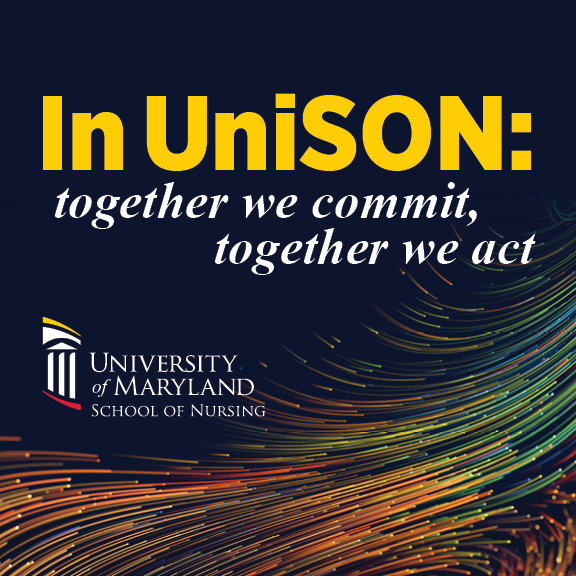In UniSON: Making a Statement
August 11, 2021 Giordana Segneri
UMSON’s anti-oppression position statement formally acknowledges the school’s commitment to dismantling structural racism and other forms of structural oppression.
Fifteen months ago, when the world was already roiling from the COVID-19 pandemic, another public health crisis came into stark relief when George Floyd was murdered at the hands of Derek Chauvin, a Minneapolis police officer. Our nation was at once seeking isolation because of the pandemic and, through the Black Lives Matter movement, opening up to the possibility of real change in a culture and history long steeped in systemic racism.
For a class assignment, a group of undergraduate students penned a letter about their experiences at UMSON, which led the faculty member teaching that course, Kate Scott, DNP ’19, MPH, CRNP, RN, assistant professor, and others to initiate conversations about how to address the students’ experiences, observations, and concerns. As a result of those conversations and the nation’s public health crises, the School’s Diversity, Equity, and Inclusion (DEI) Committee, of which Scott was a member, determined a need to draft a statement.
“The students in my undergraduate public health course helped me realize that we needed a School-wide effort to address oppression in all its forms,” Scott says. “They complete an advocacy letter for a grade, which inspired a group of the students to write a letter to the dean about discrimination and the need to address race and racism at the School and throughout the curriculum.”
At about the same time, a separate group of UMSON faculty and staff, led by Jeffrey Ash, EdD, assistant professor and associate dean for diversity and inclusion, also began considering a statement on behalf of the School. The two groups joined forces to develop a single document, combining the strengths of their efforts: “One piece was more about values, the other was more who do we want to be and how do we want to show up,” says Nicole Palmore, MSW, director of diversity and inclusion.
“The diversity and inclusion landscape has really evolved over the past few years,” Ash says. “There is a greater calling and intensity to dismantle structural and systemic racism. As we work to prepare and educate the next generation of nursing and health care leaders, we must be absolutely clear about our expectations on where we stand against racism. This statement provides that strategic and visual clarity and makes room to embed our stance in every fiber of our School of Nursing existence now and for generations to come.”
After finalization by the DEI Committee, which recently was approved for promotion to a shared governance body with elected members and is now the DEI Council, the statement was reviewed by the School’s highest governance body, the Governance Council. “The only concern raised was ‘let’s do our very best to make it as inclusive as possible,’ which is why the language is so far reaching,” Palmore says. “It came from a focus on anti-Black racism, but it’s anti-oppression in all forms, even the ones we might not know yet.”
With ratification by the Governance Council, UMSON plans to introduce its anti-oppression position statement, “In UniSON: Together We Commit, Together We Act,” at the All-School Assembly in late August, formally signaling the School community’s commitment to dismantling structural racism and other forms of structural oppression. UMSON’s Office of Diversity and Inclusion, in collaboration with the DEI Council, has planned an in-person celebration of the statement’s introduction later this fall and is working to advance efforts, including two upcoming employee professional development opportunities (one focused on committing and the other on acting), that weave the statement’s sentiments into the fabric of daily life at the School.
An excerpt from the statement:
We condemn oppression in all forms within the School, among our partners, and in the broader community. We strive to understand how to make a more supportive, welcoming, and restorative community. We will work to stop the perpetuation of white supremacy, which results in the unfair treatment of our students, colleagues, patients, and neighbors. Our inaction, when our neighbors are deprived of quality education, fair policing, housing, employment, food, and health care, is not acceptable.
In unison, we advocate for a School that intentionally creates positive change to address structural oppression.